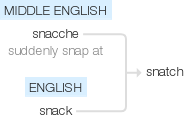Snatch
Middle English sna(c)che (verb) ‘suddenly snap at’, (noun) ‘a snare’; perhaps related to snack.
wiktionary
From Middle English snacchen, snecchen, from Old English snæċċan, sneċċan, from Proto-Germanic *snakkijaną, *snakkōną(“to nibble, snort, chatter”); see *snūtaz(“snout”).
Cognate with Dutch snakken(“to sob, pant, long for”), Low German snacken(“to chatter”), German schnacken(“to chat”), Norwegian snakke(“to chat”). Related to snack.
etymonline
snatch (v.)
early 13c., "make a sudden snap or bite" (at something), of uncertain origin; perhaps from an unrecorded Old English *snæccan or Middle Dutch snacken "to snatch, chatter." Compare snack (n.). Meaning "lay hold of suddenly" is from early 14c.; especially "take from someone's hands" (1580s). Weight-lifting sense is attested from 1928. Related: Snatched; snatching.
snatch (n.)
c. 1300, "a trap, snare," from snatch (v.). Meaning "a sudden grab" is from 1570s; that of "a small amount" is from 1590s. Sense in weight-lifting is from 1928. Vulgar slang sense of "vulva" is recorded by 1903, perhaps 1864; a much older venereal sense was "sexual intercourse quickly performed" (1580s).
